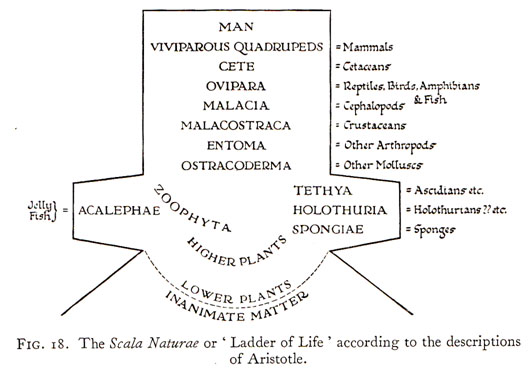
from Charles Singer, A Short History of Biology, via Roger Wotton Blog
| The Great Chain of Being | ||
| Systematics | Aristotle's Scala Naturae |
| Systematics | |||
| Systematics | Systematics | Systematics | Linnaean taxonomy |
 |
|
from Charles Singer, A Short History of Biology, via Roger Wotton Blog |
 |
| Marble bust of Aristotle. Roman copy after a Greek bronze original by Lysippus c. 330 BC. Photo by Jastrow, via Wikipedia, Public domain |
Aristotle (384-322 b.c.e.) was a Greek philosopher and polymath, whose writings range across such diverse subjects as physics, metaphysics, poetry, theater, music, logic, rhetoric, linguistics, politics, government, ethics, biology, and zoology. He was the first to create a comprehensive system of Western philosophy, encompassing morality, aesthetics, logic, science, politics, and metaphysics. Although he observed and wrote about the natural world, he was not a scientist in the Baconian-Galilean mode of empiricism and experimental method; rather he had a qualitative and teleological view of nature.
Aristotle was the first to give the first detailed classification of living things, and hence the first systematists. He did not classify plants or fungi, but his classification of animals was as follows:
Aristotle's ideas were essentially based on the idea of the scala naturae, the "Natural Ladder" according to which the entire natural world could be arranged in a single continuum. During the medieval period this become incorporated into the idea of the Great Chain of Being.
Though Aristotle's work in zoology was not without errors, it was the greatest biological synthesis of the time, and his work remained the ultimate authority in understanding the secular world until the rise of modern knowledge in the 16th century, and his classification of living organisms contains some elements which still existed in the 19th century. He classified animals by their way of life, their actions, or by their parts. Aristotle described the embryological development of a chick; the chambered stomachs of ruminants and the social organization of bees; and noticed that some sharks give birth to live young, and his observations on the anatomy of octopus, cuttlefish, crustaceans, and many other marine invertebrates were so accurate they could only have been made from first-hand experience with dissection.
Aristotle divided animals into two types: those with blood, and those without blood (or at least without red blood), corresponding to our distinction between vertebrates and invertebrates. The blooded animals, corresponding to the vertebrates, included five genera: viviparous quadrupeds (mammals), birds, whales (which he did not realize were mammals), oviparous quadrupeds (reptiles and amphibians), and fishes. This basic division was to be adopted by Linnaeus, for whom the "genera" became classes. The bloodless animals were classified as cephalopods (such as the octopus); crustaceans (malacostraca); insects (entoma - hence "entomology"), which also included arachnids and centipedes; testacea or shelled animals such as non-cephalopod molluscs and echinoderms; and zoophyta, or "plant-animals," such as corals, which supposedly resembled plants and hence were considered intermediate between the plant and animal kingdoms.
Despite the quite modern nature of his zoological system, Aristotle was not an evolutionist, but an essentialist. For him, species have never changed. There were some eaerlier Greek philosopher naturalists, such as Empedocles, who developed at least in germinal form ideas remarkable similar to those of Darwin's theory of natural selection (ref). Like Aristarches (spelling?) heliocentriosm, such remarkable insights would have to wait for the rise of modern science becfore beiung rediscovered.
MAK130327
page last modified MAK130319, original material by MAK Creative Commons License